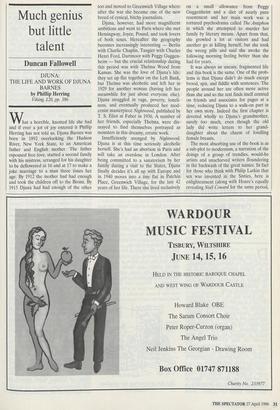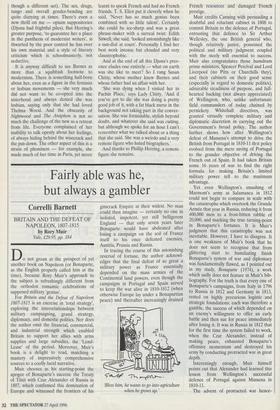Much genius but little talent
Duncan Fallowell
DJUNA: THE LIFE AND WORK OF DJUNA BARNES by Philip Herring Viking £20, pp. 386 hat a horrible, knotted life she had and if ever a jot of joy entered it Phillip Herring has not told us. Djuna Barnes was born in 1892 overlooking the Hudson River, New York State, to an American father and English mother. The father espoused free love, started a second family with his mistress, arranged for his daughter to be deflowered at 16 and at 17 to make a joke marriage to a man three times her age. By 1912 the mother had had enough and took the children off to the Bronx. By 1915 Djuna had had enough of the other too and moved to Greenwich Village where after the war she became one of the new breed of cynical, bitchy journalists.
Djuna, however, had more magnificent ambitions and went to Paris where she met Hemingway, Joyce, Pound, and took lovers of both sexes. Hereafter the geography becomes increasingly interesting — Berlin with Charlie Chaplin, Tangier with Charles Henri Ford, Dartmoor with Peggy Guggen- heim — but the crucial relationship during this period was with Thelma Wood from Kansas. She was the love of Djuna's life; they set up flat together on the Left Bank, but Thelma was alcoholic and left her in 1929 for another woman (having left her meanwhile for just about everyone else). Djuna struggled in rage, poverty, loneli- ness, and eventually produced her mod- ernist masterpiece Nightwood, published by T. S. Eliot at Faber in 1936. A number of her friends, especially Thelma, were dis- mayed to find themselves portrayed as monsters in this dreamy, erratic work.
Insufficiently avenged by Nightwood, Djuna is at this time seriously alcoholic herself. She's had an abortion in Paris and will take an overdose in London. After being committed to a sanatorium by her family during a visit to the States, Djuna finally decides it's all up with Europe and in 1940 moves into a tiny flat in Patchin Place, Greenwich Village, for the last 42 years of her life. There she lived reclusively on a small allowance from Peggy Guggenheim and a diet of nearly pure resentment and her main work was a tortured psychodrama called The Antiphon in which she attempted to murder her family by literary means. Apart from that, she growled a lot at visitors and had another go at killing herself, but she took the wrong pills and said she awoke the following morning feeling better than she had for years.
It was always an uneasy, fragmented life and this book is the same. One of the prob- lems is that Djuna didn't do much except brood, spit, and fiddle with sentences. The people around her are often more active than she and so the text finds itself centred on friends and associates for pages at a time, reducing Djuna to a walk-on part in her own story. Indeed the first chapter is devoted wholly to Djuna's grandmother, surely too much, even though the old lady did write letters to her grand- daughter about the charm of fondling female breasts.
The most absorbing use of the book is as a sub-plot to modernism, a narration of the doings of a group of trendies, would-be artists and unachieved writers floundering in the backwash of the great names. In fact for those who think with Philip Larkin that sex was invented in the Sixties, here is enlightenment (along with Hoare's equally revealing Noel Coward for the same period, though a different set). The sex, drugs, tango and overall gender-bending are quite dizzying at times. There's even a new thrill on me — opium suppositories (Djuna had frightful piles). But Herring's greater purpose, 'to guarantee her a place in the pantheon of modernist writers', is thwarted by the poor control he has over his own material and a style of literary criticism which is schoolmasterly, not seductive.
It is anyway difficult to see Barnes as more than a squibbish footnote to modernism. There is something half-born about her, even as a figure in the feminist or lesbian movements — she very much did not want to be co-opted into the sisterhood and always denied she was lesbian, saying only that she had loved Thelma Wood. And the obscurity of Nightwood and The Antiphon is not so much the challenge of the new as a retreat from life. Everyone complained of her inability to talk openly about her feelings, of always hiding behind the wisecrack and the put-down. The other aspect of this is a strain of phoniness — for example, she made much of her time in Paris, yet never learnt to speak French and had no French friends. T. S. Eliot put it cleverly when he said, 'Never has so much genius been combined with so little talent'. Certainly she could be ice-sharp and was a great phrase-maker with a surreal twist: Edith Sitwell, she said, 'looked astonishingly like a sun-dial at court'. Personally I find her best work intense but clouded and very claustrophobic.
And at the end of all this Djuna's pres- ence eludes one entirely — what on earth was she like to meet? So I rang Susan Chitty, whose mother knew Barnes and whose father had an affair with her.
'She was dying when I visited her in Pachin Place,' says Lady Chitty. 'And if you've got to die she was doing a pretty good job of it, with a fat black nurse in the background not taking part in the conver- sation. She was formidable, stylish beyond doubt, and whatever she said was cutting, but although we spoke for an hour I can't remember what we talked about or a thing that she said. She was a weirdo and a very remote figure who hated biographers.'
And thanks to Phillip Herring, a remote figure she remains.



























































 Previous page
Previous page